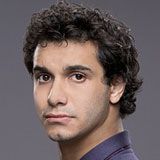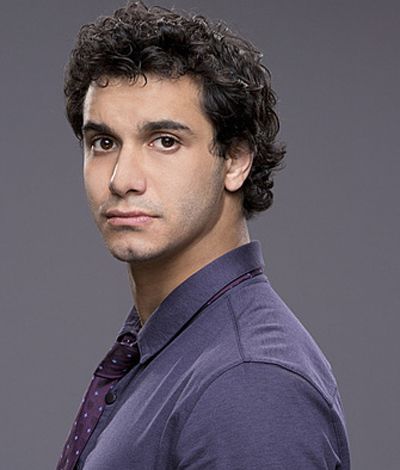They say one of the keys to good acting is reacting, but Elyes Gabel’s role on CBS’s Scorpion makes that a little tricky.
That’s because a central trait of the person who inspired the character -- genius hacker-turned-government contractor Walter O’Brien -- is known as much for his lack of emotional connectivity as he is for his off-the-charts IQ. O’Brien himself admits that, in the course of the world-saving assignments he and his team undertake, he simply lacks the ability to feel things in the ways most people do.
That leaves Gabel, whose credits include World War Z, Game of Thrones and the upcoming Interstellar, with a little less to go on as he creates his own version of Walter for the new drama (it premieres tonight at 9 ET/PT). Or, as the actor explained to Spinoff Online, possibly a little more.
Spinoff Online: You're taking what you're learning from the real Walter O’Brien, and from seeing him in action, and then translating it into your character into something TV audiences will want to invest in. Can you tell me about your process of finding the essence of the real person and then making it accessible for everyone?
Elyes Gabel: You always have to start from like a center of truth. I think that the things that yield a lot more fruit are the things where if a person – not the suffering that they do; I'm not trying to hit myself over the head with the script with it – but I think the more you find about the vulnerability of the darkest [aspects], the more you find about yourself and you attach some kind of a meaning to whatever you've lived, the more gravitas or the more weight that it has and the more truth it speaks to you as well. Especially in a format like this, where you're shooting constantly, where you have to really kind of find the real center for the attachment, how you sort of look at things as a parallel. I'm never going to think the same way or the same speed that Walter does. I'm not a genius, but the whole thing about the bells and the whistles of filming is that it's really what's inside there, and we find a connection. The great thing about the show is that we're saying that he's a very different person. His honesty at times is contradictory to the humanity, but that's not the case. He has a great amount of humanity in real life, and also that transcends into the show. That's the large kind of neon light on top of the show, saying “This guy does not have empathy,” right? “This guy does not have the ability to communicate with people normally.” And it's a great obstacle to overcome. Just scripturally, the words are going to be there to say exactly that. You have to find a way of saying there's a lot of warmth in the guy, to find the humanity in the guy as well. And it always has to come from a real place.
Alex Kurtzman on the Real Genius of "Scorpion"
What are some of the fascinating elements you’ve tried to capture?
His process before he starts speaking is incredible. To be able to replicate that, to be able to think like that or to start jutting in at certain moments – it gives a man a headache a lot! So I've got to go back home and start learning lines, and then you come back in, but it's always a challenge, which is nice. You feel like you've been really worked out. It's like a good gymnastic exercise.
What's been the hardest thing to wrap your head around?
Not the costume. I think the hardest thing to wrap your head around is sometimes with the technical rudiments. You have so much that really makes sense, because these guys [on Walter’s team] are thinking about 20-odd things at the same time, they're jutting in. They're finishing off each other's sentences. Just a way of making sure that that seems fluid and real rather than going, “Hey, so this is yours – This is my bit. This is your bit.” They do all kinds of work hard for one symbiotic, conscious stream. It's like the same verbal diarrhea from the same mouth.
The real Walter has said that he doesn't have an emotional section of his brain. I imagine by watching him, you would beg to differ. How do you play that?
I think that line is to make this interesting, having that constant stream of episodes and content, is saying that when you talk about who you are, you are projecting a story of who you think you are. And that's based on your experiences, what's going on up there, what's happened in the past. And that's why it's so important to really, really know the guy from before, because I'm saying things [in character] about how honest I am, how unemotional I am, but at certain times, when the trauma's there, you're allowed to kind of feel those emotions. You don't necessarily give it out in this environment. I'm not going to start crying in this environment, it doesn't mean I'm not an emotional person. And I've got a responsibility – or Walt has a responsibility with his crew, with his team, so I think the jewel in that is looking at the content and finding where the best way you can really exploit emotions coming through. And the great thing is the ironic or the contradictory [side] of vulnerability.



